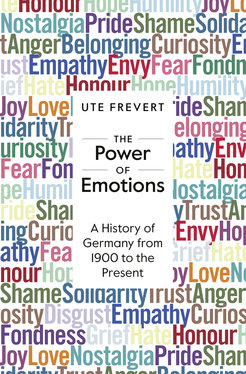Emotional Citizens: Love, Loyalty, and Trust in Politics
Ute Frevert
Emotions in Germany during the long 20th century: Following the 2019 exhibition The Power of Emotions. Germany 19 / 19, I started to do further research on how emotions affected and were affected by events, experiences, and developments that shaped German history from around 1900 to the present.
Politically, the time period saw five to six different regimes: the semi-parliamentarian German Empire (until 1918), the short-lived democratic Weimar Republic (1919–1933), the Nazis’ Third Reich (until 1945), and, in 1949, the foundation of two German states that, in 1990, merged into one. Such dynamic history came with different emotional repertoires. Attachment to the royal family before 1918 (and, for some, even after) struck distinct emotional chords compared to approval of a republican head of state, especially when, as in the Weimar Republic, the first president elected was a Social Democrat leather worker and the second a war general. Love for the Führer felt different from love for socialism or respect for the president of a liberal-democratic state.
The same held true for other emotions as they played out over the course of 20th-century German history. Envy and solidarity, for instance, showed different expressions in times of economic crisis or during the economic “miracle” of the 1950s and 1960s. Hatred came in different forms, be it class hatred, as in the Weimar Republic, or racial hatred that was encouraged during the Nazi period and shunned ever since.
The research focused on 20 emotions, from anger to trust, from feelings of belonging to affection toward foreign nations and state representatives, from hope (for the future) to nostalgia. These emotions are, on the one hand, seen as objects of an emotional politics conducted by various institutions including governments, parties, churches, and schools. Social movements have also played a crucial role in whipping up certain emotions and taming others. On the other hand, citizens do more than receive emotional messages from above or below and translate them into their own feelings. They also, as members of institutions and movements, engage in shaping emotional styles and practices as well as in framing affective atmospheres. Their own voices thus have to be listened to, even if they are not always easy to find.
Drawing on archival sources (like letters to monarchs and presidents) and printed material such as ego-documents, newspapers, parliamentary minutes, and court rulings, I tried to uncover the traces that emotions have left and reconstruct the work they did in specific situations and under specific historical circumstances. I focused both on the political impact of emotions and on how they changed over a period of more than 100 years. The resulting book was published in September 2020 and enjoyed widespread media coverage. It has now been thoroughly revised and rewritten to accommodate an English-speaking audience. The English version is scheduled for publication in August 2023 with Cambridge University Press.
Key References



